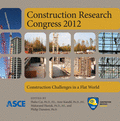Working in Inter-Disciplinary, Multi-Cultural Teams: Lessons from the Field
Publication: Construction Research Congress 2012: Construction Challenges in a Flat World
Abstract
As the construction industry continues to grow globally there is an increased demand for graduates who possess the skills necessary to work in inter-disciplinary and multi-cultural teams. These skills, while fostered in the classroom, require a contextual learning environment to allow students to personalize the information. Using a constructivist approach allows these skills to be acquired and improved over time. This type of learning environment was created during a field research project supported by a National Science Foundation, Pan-American Advanced Studies Institute (PASI) grant, where two teams of multi-disciplinary researchers traveled to areas of Perú to reverse engineer the Inka Road with the objective of identifying sustainable engineering practices. The teams consisted of engineers, architects, constructors, archeologists, anthropologists, historians, a music culturist, and a high school student. Additionally the team members were from three different continents representing seven different countries and were a mix of faculty, graduate students, undergraduate students, and industry professionals. The work undertaken required documenting engineering and construction practices of the ancient Inka Road and its associated structures, to include hydraulic channels, terraces, retaining walls, storage areas and ritual sites. While in the field the outcomes of the daily work was shared with an audience at the Smithsonian Institutes National Museum of the American Indian via live interactive satellite broadcasts. These broadcasts were also available over the internet. This required the teams to work cooperatively in an unpredictable physical and time constrained environment to ensure success of the broadcasts. Team members came to understand the challenges of working together with unfamiliar people speaking various languages and utilizing discipline specific terminology. This setting provided participants with the opportunity to develop a greater understanding of the skills required to be successful working in these types of teams. This paper examines the benefits, challenges, and opportunities of performing engineering research with inter-discipline, multi-cultural teams in a field environment.
Get full access to this article
View all available purchase options and get full access to this chapter.
Information & Authors
Information
Published In
Copyright
© 2012 American Society of Civil Engineers.
History
Published online: Jul 11, 2012
Authors
Metrics & Citations
Metrics
Citations
Download citation
If you have the appropriate software installed, you can download article citation data to the citation manager of your choice. Simply select your manager software from the list below and click Download.
